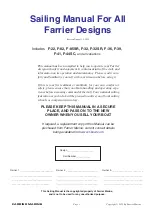
10
SAFETY INFORMATION
Operators and Passengers...
– Never operate a boat while under
the influence of drugs or alcohol. It
is a Federal offense. Allow only qual-
ified drivers to operate your boat.
Remember that sun, wind, alcohol,
drugs, fatigue or illness may impair
your judgement and reaction time.
– At least one passenger should be
able to operate the boat in case the
operator is unexpectedly unable to
do so.
– Operation of this boat by a person un-
der 16 years of age or a person with
a disability that impairs vision, reac-
tion time, judgment, or operation of
the controls is NOT recommended.
– Always use the lanyard stop switch
when operating the boat and en-
sure that all passengers are familiar
with its use.
– Ensure that any operator and all pas-
sengers know how to swim and how
to re-board the boat from the water.
If a passenger does not know how to
swim, ensure that passenger wears
a PFD at all times and take extra pre-
cautions when boating.
Regarding Fuel and Fueling...
– Remember that fuel and gasoline
fumes are flammable and explosive
under certain conditions. Be very
careful when fueling and adhere to
the fueling procedures contained in
this
Operator’s Guide
and those giv-
en to you by the marina. Always
stop the engine before fueling and
never allow anyone to remain in the
boat while fueling. Each time you fill
up, assure that the engine compart-
ment is free of gasoline vapors, and
inspect fuel lines for leaks and hose
deterioration.
– Do not smoke or allow open flames
or sparks in the vicinity.
– Know the capacity of the fuel tank.
Avoid fueling at night except under
well-lit conditions. Gas spills are not
noticeable in the dark. Do not carry
spare fuel or flammable liquids in any
of the storage or engine compart-
ments.
Safety Equipment
An operator and the boat's passen-
ger(s) should have ready access to
shatterproof glasses should riding con-
ditions or personal preference warrant.
Wind, water spray and speed may
cause a person's eyes to water and
create blurred vision.
As the owner of the boat, you are re-
sponsible for assuring that all required
safety equipment is aboard. You should
also consider supplying additional
equipment as needed for your safety
and that of your passengers. Check
state and local regulations and call the
U.S. Coast Guard Boating Safety Hot-
line at 1 800 368-5647 for information
about required safety equipment.
Required Safety Equipment
Safety equipment required by federal
regulations is mandatory. Personal flo-
tation devices must be fitted to the
people wearing them. If local regula-
tions require additional equipment, it
must be approved by the U.S. Coast
Guard (USCG). Minimum require-
ments include the following:
– personal flotation devices
– fire extinguisher
– visual distress signal
– navigation lights
– bell or whistle.
A cellular telephone in a waterproof
bag or container has also been found to
be beneficial to boaters when in dis-
tress or just for contacting someone on
shore.
lmo2005-006a_1.book Page 10 Wednesday, July 7, 2004 1:06 PM
Summary of Contents for Utopia
Page 1: ......
Page 9: ...SAFETY INFORMATION 7 SAFETY INFORMATION ...
Page 28: ...26 SAFETY INFORMATION ...
Page 29: ...27 VEHICLE INFORMATION ...
Page 38: ...36 TYPICAL REAR VIEW UTOPIA 205 F10L39N 30 39 39 17 18 49 48 50 15 40 29 43 15 41 42 30 ...
Page 74: ...72 ...
Page 75: ...73 MAINTENANCE INFORMATION ...
Page 92: ...90 ...
Page 93: ...91 WARRANTY INFORMATION ...
Page 116: ......













































